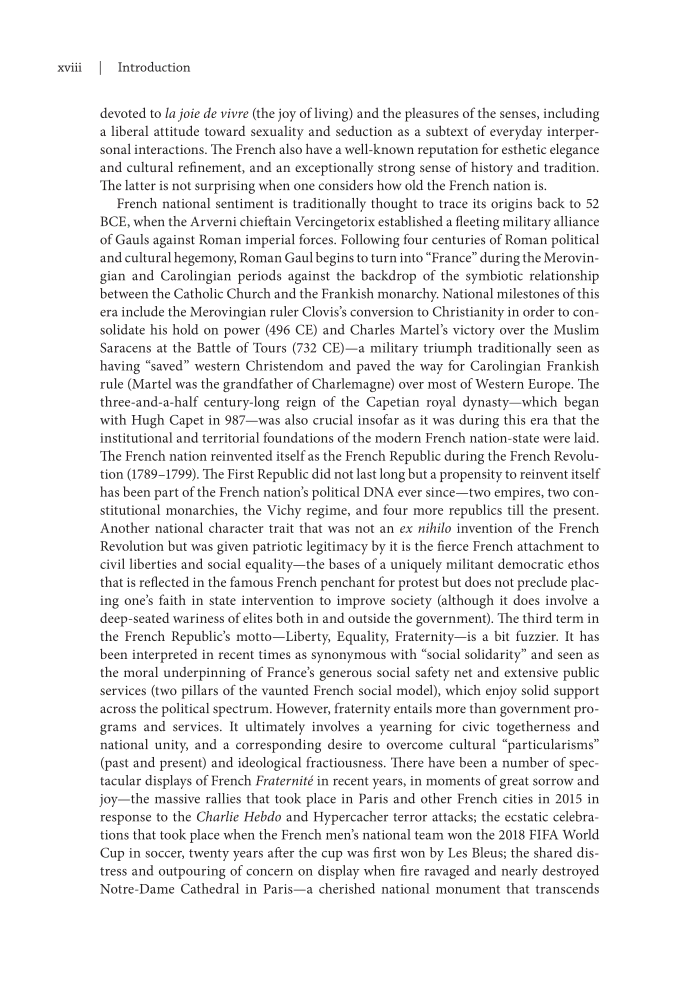xviii | Introduction devoted to la joie de vivre (the joy of living) and the pleasures of the senses, including a liberal attitude toward sexuality and seduction as a subtext of everyday interper- sonal interactions. The French also have a well-known reputation for esthetic elegance and cultural refinement, and an exceptionally strong sense of history and tradition. The latter is not surprising when one considers how old the French nation is. French national sentiment is traditionally thought to trace its origins back to 52 BCE, when the Arverni chieftain Vercingetorix established a fleeting military alliance of Gauls against Roman imperial forces. Following four centuries of Roman political and cultural hegemony, Roman Gaul begins to turn into “France” during the Merovin- gian and Carolingian periods against the backdrop of the symbiotic relationship between the Catholic Church and the Frankish monarchy. National milestones of this era include the Merovingian ruler Clovis’s conversion to Christianity in order to con- solidate his hold on power (496 CE) and Charles Martel’s victory over the Muslim Saracens at the Battle of Tours (732 CE)—a military triumph traditionally seen as having “saved” western Christendom and paved the way for Carolingian Frankish rule (Martel was the grandfather of Charlemagne) over most of Western Europe. The three-and-a-half century-long reign of the Capetian royal dynasty—which began with Hugh Capet in 987—was also crucial insofar as it was during this era that the institutional and territorial foundations of the modern French nation-state were laid. The French nation reinvented itself as the French Republic during the French Revolu- tion (1789–1799). The First Republic did not last long but a propensity to reinvent itself has been part of the French nation’s political DNA ever since—two empires, two con- stitutional monarchies, the Vichy regime, and four more republics till the present. Another national character trait that was not an ex nihilo invention of the French Revolution but was given patriotic legitimacy by it is the fierce French attachment to civil liberties and social equality—the bases of a uniquely militant democratic ethos that is reflected in the famous French penchant for protest but does not preclude plac- ing one’s faith in state intervention to improve society (although it does involve a deep-seated wariness of elites both in and outside the government). The third term in the French Republic’s motto—Liberty, Equality, Fraternity—is a bit fuzzier. It has been interpreted in recent times as synonymous with “social solidarity” and seen as the moral underpinning of France’s generous social safety net and extensive public services (two pillars of the vaunted French social model), which enjoy solid support across the political spectrum. However, fraternity entails more than government pro- grams and services. It ultimately involves a yearning for civic togetherness and national unity, and a corresponding desire to overcome cultural “particularisms” (past and present) and ideological fractiousness. There have been a number of spec- tacular displays of French Fraternité in recent years, in moments of great sorrow and joy—the massive rallies that took place in Paris and other French cities in 2015 in response to the Charlie Hebdo and Hypercacher terror attacks the ecstatic celebra- tions that took place when the French men’s national team won the 2018 FIFA World Cup in soccer, twenty years after the cup was first won by Les Bleus the shared dis- tress and outpouring of concern on display when fire ravaged and nearly destroyed Notre-Dame Cathedral in Paris—a cherished national monument that transcends
Document Details My Account Print multiple pages
Print
You have printed 0 times in the last 24 hours.
Your print count will reset on at .
You may print 0 more time(s) before then.
You may print a maximum of 0 pages at a time.




























































































































































































































































































































































































































































































































































